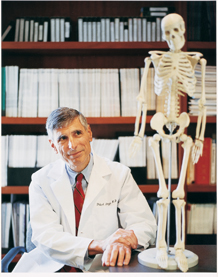Leslie Williamson |
|
 |
|
Dear Readers,
Say the word Vioxx and you’re apt to strike a nerve. Undoubtedly, you’ll tap into anger at the drug’s manufacturer. You’re also likely to unleash some anger at the FDA for keeping the drug on the market, despite its side effects of increased risk for heart attack and stroke — which had apparently been recognized for some time. And you’ll hear of the true misery among arthritis patients left with no effective substitute medication now that a drug they relied on has been withdrawn.
Pharmaceuticals are one of our society’s great assets, easing our pains, preventing illness and sometimes curing disease all together. But the public’s faith in their reliability is waning. That’s troubling because it strikes at the core of our health-care system. Indeed, there are parallels between the lack of public trust in our current health-care system and Americans’ concerns about drug costs and safety. In spite of this, as you’ll read in this issue of Stanford Medicine, drugs are part of the fabric of the American culture. In fact nearly half of the population takes at least one prescription every day. That’s a phenomenal statistic.
I believe a root cause of the loss in trust is an information gap. Physicians, as well as consumers, lack access to the results of clinical trials for drugs on the market. Currently, the results of many clinical trials are not even publicly available and those that are reported — even in leading medical journals — may have had a biased analysis. That means we’re all at a loss when it comes to assessing the evidence on a drug’s safety and efficacy.
A mandatory, all-inclusive registry for all clinical trials will go a long way toward fixing this problem. While not a panacea, the registration of clinical trials in a publicly accessible database would provide the opportunity to assure that all the key constituencies — consumers, journal editors, the academic community, industry, the FDA and the NIH — have access to the important information that forms the basis of clinical trials, thus avoiding the potential for bias in reporting or regulatory filing.
As the chair of the National Academy of Science’s Institute of Medicine Health Science Policy Board, I’ve met with major medical journal editors and pharmaceutical industry leaders over the past several months seeking a solution that will satisfy us all. We’ve made considerable progress in creating a set of principles for a clinical trial registry. Key among these are the notions that the registry must be global in perspective, open to all prospective registrants, managed by a not-for-profit organization and set up so as not to reduce the incentive to do clinical research, whether publicly or privately funded.
We further defined what would be contained in a clinical trials registry and will discuss our proposals at a public meeting at the end of June. Given the current activity in the Congress to regulate clinical trial reporting and registries and the strong stance taken by medical journal editors, industry and the public, this process is timely. I hope you’ll take a look at our work to date: (http://www.iom.edu). We also welcome your comments as we move this matter to resolution in a manner that supports and values the public trust.
In recent issues of Stanford Medicine, the theme of gaining public trust has been highlighted in the debate on stem cell research and the nation’s increasingly deficient health-care system. Trust is also a factor in the public perception of drugs, the pharmaceutical industry and the governmental agencies that regulate them. I hope Stanford Medicine can be a vehicle to communicate significant health-care issues more clearly and, in the end, play a part in reclaiming the public’s esteem for the medical profession
With best regards,
Philip A. Pizzo, MD
Professor of Pediatrics and of Microbiology and Immunology
Carl and Elizabeth Naumann Professor
Dean, Stanford University School of Medicine

